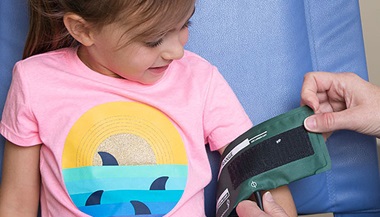What Is Hand, Foot and Mouth Disease?
Featured Expert
How to Treat Hand, Foot and Mouth Disease
What is hand, foot and mouth disease and how do you get it? Ebony Hunter, M.D., is a pediatric emergency medicine physician at Johns Hopkins All Children’s Hospital. On this week’s On Call for All Kids, she explains what parents need to know about hand, foot and mouth disease.
Hand, foot and mouth disease is a viral illness that mainly affects children, generally under age 10. It causes sores in the mouth, on the hands, feet, and sometimes buttocks and genital areas. Some people also refer to it as herpangina.
What are the symptoms of hand, foot and mouth?
The main symptoms include sores of the mouth, hands, feet and buttock, and they can be red and sometimes painful. Since the areas become painful, some children may not want to eat, walk or sit on the areas that have the sores. Some children may also have fever and other viral-like symptoms such as runny nose.
How is hand, foot, mouth spread?
It’s spread from saliva, fluid from sores and feces. Most children spread within the first week of getting the illness but can actually shed the virus longer than that. Children are contagious as long as they have sores and fever.
Do children need to have a test performed if they contract it?
Usually, no test is indicated as this is a physical diagnosis meaning we know what it is by looking at it. So testing is usually not necessary.
How is it treated and when should I call my doctor?
We recommend supportive care for the pain. You can give your child over-the-counter pain medications such as ibuprofen or acetaminophen as needed assuming they have no other contraindications to those medications. Never give children aspirin. Since the sores may cause pain, you may have to give a soft diet and cool/cold fluids to help soothe the mouth pain. We recommend calling the doctor if your child stops drinking and had no urine for more than six to eight hours. While we anticipate the child to possibly be less active, the child should also still be responding to voice, sound and touch. If you see your child is not being stimulated, then we absolutely need to see you.
Can adults get hand, foot and mouth disease?
Yes, but it’s rare and usually milder symptoms.
How can I prevent spread?
With good handwashing. Also good cleaning of community play areas will help. For parents whose children are infected, keeping them away from other children is key.







